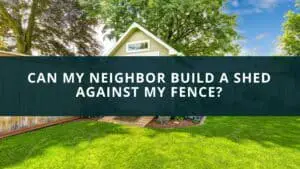Are you thinking of expanding your property? The only way would be to buy part of your neighbor’s lot. So, you might ask, can I buy my neighbor’s yard?
You can buy your neighbor’s yard. The process is similar to when you bought the house except for more municipality restrictions. You should research the possibility, consult a real estate attorney, talk to your neighbor, determine the sale price, get municipality approval, and hire a surveyor.
Depending on the size of the yard and other factors, you may have to split the lot or adjust the boundary line. Here, we discuss whether you can buy your neighbor’s backyard.
Quick navigation
How to Buy Your Neighbor’s Backyard?
If you’re planning to buy your neighbor’s backyard, there are many things you’ll have to do. They include:
1. Research on the Possibility
The first thing you should do is to determine the possibility of the deal you’re about to enter. You can ask an attorney to do this for you or do it on your own. It might involve going to the municipal office since the local authorities are crucial to the deal. For example, suppose your neighbor doesn’t use their yard, and it’s offering them no value. It might make sense to buy it and move your fence closer to claim the backyard as yours. The neighbor might also agree with you.
But the municipality authority will most likely disagree with the change. Buying the yard will make your neighbor’s property smaller, which isn’t good for the neighborhood. The same rules will apply to lots that are already small. The law would most likely not sanction a sale of part of the land. However, if you live in a neighborhood where the lots are big, your municipal authorities are more likely to authorize such a deal and allow you to buy part of your neighbor’s yard.
Of course, there are still zoning bylaws to be aware of. They differ from one location to another, and the standard in your area will affect your ability to buy your neighbor’s yard. For example, lots must come in a minimum size. If buying your neighbor’s yard means their yard will be smaller than the minimum allowable, you’ll not be able to buy it.
2. Consult A Real Estate Attorney
The attorney will help you handle all the individual research about shifting boundary lines, which approvals you need to get, what documents you should file, and all other processes. The real estate lawyer should be familiar with your local laws so they can advise you on the steps to take and the processes. There are rules on lot adjustments that you have to comply with
Consulting a real estate lawyer is essential. It prepares you for what’s to come. You already know what could go wrong and can adequately prepare for it. It also helps you to know whether it’s even worth pursuing. For example, if there are a lot of bureaucratic hoops you have to jump through, it might not be worth it.
This shouldn’t cost you much since you’re not asking the attorney to do anything significant. You can use an attorney you have a relationship with before or let them recommend someone to you.
3. Talk To Your Neighbor
Once you’ve confirmed that the deal is possible, you can discuss it with your neighbor. They have to be open to the possibility of selling for you to buy. If they don’t want to sell, there’s nothing you can do about it. But if they’re open to selling, you’re set for the next steps.
4. Determine the Price of The Lot
You can decide this based on a discussion with the seller, or you could call in a realtor to value the land. There are a lot of things that could go into determining the valuation. These include the size of the yard, whether you can build on it, the use, etc.
If you’re the one selling part of your land, you should consider the implications. For example, whether selling the yard to your neighbor would make their lot big enough to contain a commercial property. You don’t want to sell your yard and end up with a condo next to your house. This is why you should speak with an attorney before you buy or sell your yard.
Suppose the neighbor’s property has a mortgage on it. Buying the yard might be tricky. You’ll need permission from the bank or lender holding the mortgage lien. If the mortgage is in good condition and the homeowner has enough equity in the property, it may be possible to sell off the yard. But there’s a need to assess the whole property to determine the value of the part being sold.
5. Get Your Municipality Approval
You also need to get approval from your municipal authority. There are usually requirements for changing lot sizes or boundary line adjustment. You have to comply with these requirements to get approval.
6. Hire A Surveyor
After surveying the two properties, you’ll need a surveyor to redraw the boundary lines. The attorney may also need to draft new deeds for the properties that record the changes. You should get a legal opinion to know if this is necessary.
Type of Lot Adjustments
You can make two types of adjustments when buying your neighbor’s yard. They are:
1. Lot Split
With a lot split, the neighbor split their property into two, creating a new parcel of land they sell to you. Lot split makes sense if you want to buy the yard or part of your neighbor’s land for construction purposes, such as building a new house.
2. Boundary line adjustment
This shifts the boundary line deeper into the neighbor’s yard to expand yours. It’s cheaper and serves the same purpose if all you’re trying to do is make your yard bigger.
How Much Does It Cost To Buy Your Neighbor’s Yard?
This will depend on the location and size of the yard. But other factors could increase costs. If the property has mortgage issues, zoning requirements, and other things, and you’ll still pay an attorney, it could be up to $10,000 or more.
In Conclusion
It’s possible to buy your neighbor’s yard, which could make sense if you want to expand your yard. But there are a lot of things involved in the process. Sometimes, it might not be worth it, especially when there’s still a mortgage lien on the property.




